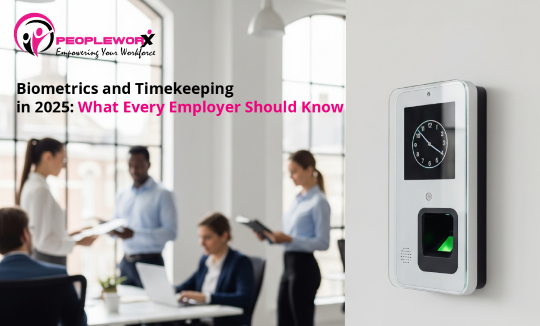How to Prevent Buddy Punching Without Inviting Legal Trouble
In today’s digital workplace, time theft is more than a productivity issue. It is a liability. One of the most common culprits is buddy punching, which occurs when one employee clocks in or out for another. This seemingly minor act costs U.S. employers over $350 million each year and undermines accountability across the organization.
To address this, many businesses have turned to biometric timekeeping tools such as facial recognition, fingerprint scanners, and retina scans. These tools help eliminate fraud and reinforce scheduling integrity. However, as more states introduce laws governing how biometric data is collected and stored, legal risk is becoming an equally important consideration.
At PeopleWorX, we help businesses strike the right balance between operational efficiency, compliance, and care. Here is what you need to know to stay ahead in 2025.
What Is Buddy Punching and Why It Matters
Buddy punching happens when one employee clocks in for another who is not present. Whether it is covering for a late coworker or leaving early without authorization, the impact is significant:
Increased labor costs
Disrupted team schedules
Lower morale among honest employees
Greater audit and compliance exposure
This type of time theft is especially common in industries with high hourly staff, rotating shifts, or dispersed teams. Examples include hospitality, home health care, retail, and construction.
How to Prevent Buddy Punching Without Compromising Privacy
Effective timekeeping in 2025 depends on three key pillars:
1. Clear Policies and Expectations:
Begin with your employee handbook. Clearly outline clock-in and clock-out procedures, and define the consequences for fraudulent time reporting. Managers should be trained to consistently apply and reinforce these standards.
2. Secure Authentication Practices:
Avoid using easily shared credentials such as employee IDs, phone numbers, or birthdates. These identifiers are not only vulnerable to misuse but also expose sensitive personal information. Modern systems offer more secure methods of authentication.
3. Smart Timekeeping Technology:
Biometric tools offer precise and fraud-resistant time tracking. By using physical characteristics such as a fingerprint or facial structure, the ability to manipulate attendance data is nearly eliminated. Additional technologies such as GPS tracking, geofencing, and smart badges can further ensure location-based compliance.
Although these tools are highly effective, they must be implemented carefully in order to comply with emerging data privacy laws.

Biometric Timekeeping and the Law: Know Your Obligations
There are currently no federal laws that regulate biometric technology in the workplace. However, several states have implemented strict policies—and more are in progress. If your company uses or plans to use biometrics, it is essential to understand your legal responsibilities based on where you operate.
Examples of Key Legislative Developments:
llinois: Biometric Information Privacy Act (BIPA)
- Requires written employee consent before collecting biometric data
- Imposes significant penalties per violation
- Grants employees the right to sue privately
- Mandates secure data retention and disposal policies
Colorado: Biometric Privacy Law (Effective July 1, 2025)
- Requires employers to obtain clear, written consent before collecting biometric identifiers
- Obligates businesses to use advanced cybersecurity measures to protect the data
- Applies to all businesses that collect biometrics for identity verification or timekeeping
New York City: Local Law 144
- Requires independent bias audits for automated hiring tools, including those using biometrics
- Employers must notify job applicants when these tools are in use
- Audit results must be publicly disclosed
Maryland and Texas
- These states have passed laws that limit biometric data sharing and require reasonable data protection measures
The risks of non-compliance are serious:
- In Illinois, class-action lawsuits have resulted in multi-million dollar settlements
- Colorado imposes civil penalties for each violation
- The Federal Trade Commission warns that surveillance practices can fall under Fair Credit Reporting Act protections, which require transparency and dispute resolution options
Building a Biometric Timekeeping Program the Right Way
If your business plans to use biometric tools, the following steps will help ensure you do so responsibly:
1. Obtain Written Consent
Use clear and separate consent forms before collecting any biometric data. Avoid burying consent in employee handbooks or unrelated documents.
2. Establish a Data Retention Policy
Clearly define how long biometric data will be stored, how it will be used, and how it will be securely destroyed when no longer needed.
3. Disclose Practices Transparently
Inform employees about the specific data being collected, the reasons for collecting it, and their rights to access or dispute the data.
4. Protect the Data
Use encryption, access controls, and logging mechanisms. Limit access to only those with a legitimate business need.
5. Train Managers Thoroughly
Ensure supervisors understand the importance of biometric data protection and are equipped to enforce policy responsibly.
The PeopleWorX Advantage

When you partner with PeopleWorX, you get more than just software. We provide strategic HR support to ensure your workforce technology is compliant, ethical, and aligned with your business culture.
- We help assess your biometric readiness and identify legal risks
- Our systems support secure employee onboarding and time tracking
- Our experts offer real-time consulting on evolving state regulations
We work directly with business owners and HR leaders to create transparent, practical solutions. The result is a system that prevents time theft and protects employee rights.
Biometric Timekeeping: Key Takeaways
Biometric timekeeping can eliminate buddy punching and improve workforce accountability. However, it also introduces privacy responsibilities that employers must take seriously. With thoughtful implementation and proper safeguards, your company can take advantage of modern timekeeping while staying compliant and building employee trust.
Need help developing a timekeeping strategy that’s secure and compliant?
📩 Reach out to PeopleWorX today to schedule a consultation.






